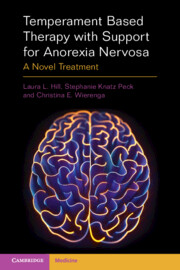Book contents
- Temperament Based Therapy with Support for Anorexia Nervosa
- Temperament Based Therapy with Support for Anorexia Nervosa
- Copyright page
- Dedication
- Contents
- Figures
- Tables
- Contributors
- Foreword
- Preface
- Acknowledgments
- Introduction
- Section 1 Temperament Based Therapy with Support (TBT-S) Overview
- Section 2 Setting Up Treatment
- Section 3 TBT-S Treatment Interventions
- Chapter 9 How to Deliver Neurobiology Psychoeducation as a Motivational Strategy
- Chapter 10 TBT-S Neurobiology Psychoeducation Module
- Chapter 11 TBT-S Neurobiology Psychoeducation Module
- Chapter 12 TBT-S Neurobiology Psychoeducation Module
- Chapter 13 TBT-S Neurobiology Psychoeducation Module
- Chapter 14 Introduction to TBT-S for Young Adults (YA TBT-S)
- Chapter 15 Young Adult TBT-S Multi-Family Group Format
- Chapter 16 Young Adult TBT-S Parent Skills Training
- Chapter 17 Young Adult TBT-S Client Skills Training
- Chapter 18 TBT-S Tools to Manage and Reduce ED Symptoms
- Chapter 19 TBT-S Experiential Activities
- Chapter 20 TBT-S Strategic Dietary Approach
- Chapter 21 Framework for Action via TBT-S Behavioral Agreement
- Chapter 22 Young Adult TBT-S Behavioral Agreement (YA BA)
- Chapter 23 Severe-and-Enduring Anorexia Nervosa Behavioral Agreement (SE-AN BA)
- Section 4 TBT-S Augmenting Eating Disorder Treatments
- Book part
- Glossary
- References
- Index
Chapter 12 - TBT-S Neurobiology Psychoeducation Module
Reward and Punishment Sensitivity
from Section 3 - TBT-S Treatment Interventions
Published online by Cambridge University Press: 31 March 2022
- Temperament Based Therapy with Support for Anorexia Nervosa
- Temperament Based Therapy with Support for Anorexia Nervosa
- Copyright page
- Dedication
- Contents
- Figures
- Tables
- Contributors
- Foreword
- Preface
- Acknowledgments
- Introduction
- Section 1 Temperament Based Therapy with Support (TBT-S) Overview
- Section 2 Setting Up Treatment
- Section 3 TBT-S Treatment Interventions
- Chapter 9 How to Deliver Neurobiology Psychoeducation as a Motivational Strategy
- Chapter 10 TBT-S Neurobiology Psychoeducation Module
- Chapter 11 TBT-S Neurobiology Psychoeducation Module
- Chapter 12 TBT-S Neurobiology Psychoeducation Module
- Chapter 13 TBT-S Neurobiology Psychoeducation Module
- Chapter 14 Introduction to TBT-S for Young Adults (YA TBT-S)
- Chapter 15 Young Adult TBT-S Multi-Family Group Format
- Chapter 16 Young Adult TBT-S Parent Skills Training
- Chapter 17 Young Adult TBT-S Client Skills Training
- Chapter 18 TBT-S Tools to Manage and Reduce ED Symptoms
- Chapter 19 TBT-S Experiential Activities
- Chapter 20 TBT-S Strategic Dietary Approach
- Chapter 21 Framework for Action via TBT-S Behavioral Agreement
- Chapter 22 Young Adult TBT-S Behavioral Agreement (YA BA)
- Chapter 23 Severe-and-Enduring Anorexia Nervosa Behavioral Agreement (SE-AN BA)
- Section 4 TBT-S Augmenting Eating Disorder Treatments
- Book part
- Glossary
- References
- Index
Summary
For those with anorexia nervosa, it is (1) not a “natural” or dominant brain response to eating like those without AN. (2)It is difficult to trust what and when to eat. (3) It is not typical to experience pleasure in eating a variety of foods. (4) Eating is anxiety provoking. Not eating appears to reduce anxiety. Individuals with AN tend to experience reduced sensitivity to reward and increased sensitivity to punishment. Altered sensitivity to reward and punishment is observed in those with AN, for both food and general rewards/losses and thus suggests a broader deficit in reward processing. Hunger does not increase reward sensitivity in AN, suggesting a deficit in translating physiological signals to motivated behavior, and explaining why individuals with AN can restrict food despite starvation. Altered reward processing may be why we see low motivation for recovery and anhedonia. Decreased brain response to reward in the cognitive circuitry in AN is associated with elevated anxiety, suggesting a brain basis for coding food as risky.
Keywords
- Type
- Chapter
- Information
- Temperament Based Therapy with Support for Anorexia NervosaA Novel Treatment, pp. 57 - 63Publisher: Cambridge University PressPrint publication year: 2022

